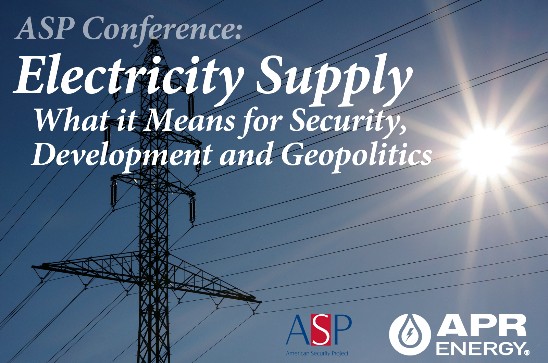 American Security Politics
American Security Politics
Bad Things Happen in the Dark
Podcast: Play in new window | Download
Subscribe: Apple Podcasts | RSS
Brian Rich, COO of APR Energy, moderated the second panel of ASP’s “Electricity Supply: What it Means for Security, Development and Geopolitics,” “The Challenges of Generating and Delivering Electricity.” Panelists Dante Disparte, CEO and Founder of The Risk Cooperative, John Morton, Chief of Staff to the President of OPIC, and Faith Corneille, Acting Director of the Office of Electricity and Energy Efficiency at US State Department, discussed the risks posed by supplying power to communities surrounded by instability, and how to mitigate these concerns successfully.
Poor governance structures and political and social instability certainly represent major barriers to generating and supplying electricity. While these factors do discourage some firms from entering into the market, the panelists focused instead on the risks a lack of access to power generates.
Bad things happen in the dark.
“Bad things happen in the dark,” Disparte stated in his opening remarks, summarizing not only the opening panels’ directive of establishing the linkage between power supply and security but also the vacuum created by the absence of power.
Morton went further on the link between poverty, risk, and power tying US national interests into this nexus.
Poor countries have a regime changes on average every 7 years. Many of those regime changes are not very kind to us, our interests, and much less to the people in the countries with the regime change. We have interests to support more stable democracies… which means we need to decrease poverty and power is a key aspect.
The Energy Resources (EnR) Bureau looks to use energy as means to protect those interests. Corneille offered insight into the office’s role touching on two important barriers to a stable power supply. “The EnR Bureau came to fruition in terms of the recognition of the links between energy and national security, geopolitical influence in conflict that emerges from energy. We can only look at Russia and Ukraine as one example, to the affordability and import dependency issues associated with the Caribbean as another example.”
As panel one discussed, the importance of micro-grid systems to distribute power to rural communities cannot be overemphasized. Before turning it over to the audience for questions, APR Energy’s Brian Rich asked the panelists to speak to some of the work being done to address the challenges companies looking to participate in this space face.
Morton responded, “[The] first point about ‘empty middle’ I totally agree – with a couple of exceptions there have been a handful of companies looking to service that space [where micro-grid systems are necessary]…There is a movement afoot for more companies that are looking at that space. They realize it is the sweet spot in many emerging markets. The successes that [APR] and OPIC clients have had show that you can operate in that niche.”
Morton went on to discuss how OPIC supports clients looking to bundle micro-grid projects across rural areas through risk insurance and financing options.
Disparte, a SME risk expert, also spoke to the opportunities micro-grid systems and equally non-traditional models present for organizations like APR Energy and others. “I think the risk proposition for…antiquated approaches is starting to shift in favor of alternatives…where in some cases they carry a much smaller footprint, not unlike APR’s approach, and they have the opportunity to connected distributed economies. Rural electrification is an attractive proposition. I think in some cases the risk in those approaches is lower than the traditional model. The traditional model is being upended.”
Several audience questions touched on the role of renewable energy sources going forward. Looking specifically at EnR’s aim to support energy generation and distribution while furthering US interests, Corneille discussed the critical need for market interventions to support the continued growth of renewable energy in addressing climate change:
“From a foreign policy perspective, we can give advice. We can try to steer investments towards clean energy infrastructure. At the end of the day the policy makers in the foreign government have to also have the political will to make those decisions… when they set their own renewable energy or clean energy targets, that’s a much more helpful starting point because we are coming in to help them achieve their own goals.”
While there are real risks to generating and supplying power, especially in politically or socially unstable environment, the true risk lies in failing to ensure reliable energy sources and distribution systems. Bad things really do happen in the dark.
Further Reading





